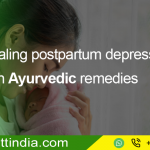Depression, a common mental health condition, affects millions worldwide. Conventional treatments often involve medications and therapy, but an increasing number of people are turning to alternative methods. Ayurveda, an ancient Indian system of medicine, offers holistic approaches to managing and alleviating depression. This article explores Ayurveda therapy for depression, highlighting its principles, treatments, and benefits.
Understanding Ayurveda
Ayurveda, meaning “science of life,” is a holistic healing system that originated in India over 3,000 years ago. It focuses on maintaining balance within the body, mind, and spirit. According to Ayurveda, health is achieved by balancing three primary energies, or doshas: Vata (air and space), Pitta (fire and water), and Kapha (earth and water). Every individual possesses a distinct constitution, known as Prakriti, which dictates their physical, mental, and emotional traits.
You will be interested on: Ayurvedic Treatment for Anxiety, Depression, Insomnia
Depression in Ayurveda
In Ayurveda, depression is often linked to an imbalance in the doshas, particularly Vata and Kapha. When Vata becomes aggravated, it can lead to anxiety, restlessness, and insomnia. On the other hand, an increase in Kapha may result in lethargy, heaviness, and feelings of sadness. Understanding one’s dosha and its imbalance is crucial for effective treatment.
Identifying Symptoms
Ayurveda identifies several symptoms of depression, including:
- Persistent sadness
- Lack of interest in activities
- Fatigue and low energy
- Difficulty concentrating
- Changes in appetite or weight
- Sleep disturbances
Recognizing these symptoms early can help in seeking timely intervention through Ayurvedic therapies.
Ayurvedic Treatments for Depression
Ayurveda offers a variety of treatments to address depression. These treatments focus on restoring balance to the doshas, enhancing mental clarity, and promoting overall well-being. Here are some key Ayurvedic therapies for depression:
Herbal Remedies
Herbs play a significant role in Ayurvedic treatments. Some commonly used herbs for depression include:
- Ashwagandha: Ashwagandha, well-known for its adaptogenic qualities, eases anxiety and tension.
- Brahmi: This herb improves cognitive function and reduces mental fatigue.
- Jatamansi: It has calming effects and aids in managing anxiety and insomnia.
- Turmeric: With its anti-inflammatory properties, turmeric helps in improving mood and reducing symptoms of depression.
Keep reading: Kerala Ayurvedic Treatments
Panchakarma
Panchakarma is a detoxification and rejuvenation process that helps cleanse the body of toxins. It includes five main procedures: Vamana (therapeutic vomiting), Virechana (purgation), Basti (enema), Nasya (nasal administration), and Raktamokshana (bloodletting). These procedures help in balancing the doshas and improving mental clarity.
Yoga and Meditation
Yoga and meditation are integral parts of Ayurveda. They help in calming the mind, reducing stress, and improving mental well-being. Regular practice of yoga asanas (postures) and pranayama (breathing exercises) enhances mental clarity and emotional stability.
Diet and Nutrition
Ayurveda emphasizes a balanced diet tailored to one’s dosha. For individuals with depression, incorporating certain foods can help in balancing the doshas. For example:
- Vata Imbalance: Warm, cooked foods with healthy fats like ghee and olive oil.
- Kapha Imbalance: Light, dry foods with spices like ginger and black pepper.
Avoiding processed foods, caffeine, and excessive sugar is also crucial in maintaining mental health.
Lifestyle Changes
Adopting a balanced lifestyle is essential in Ayurveda. This includes:
- Regular Sleep Patterns: Going to bed and waking up at the same time daily.
- Physical Activity: Engaging in regular exercise, such as walking or yoga.
- Mindfulness Practices: Incorporating mindfulness and relaxation techniques into daily routines.
Aromatherapy
Aromatherapy uses essential oils to promote mental well-being. Oils like lavender, sandalwood, and rose have calming properties that help reduce stress and anxiety. Using these oils in diffusers or as part of massage therapy can enhance mental clarity and emotional stability.
You will be interested on: Kerala Ayurveda Stress Management Package
Benefits of Ayurveda for Depression
Ayurveda offers numerous benefits for managing depression, making it an attractive option for many. Some of the key benefits include:
Holistic Approach
Ayurveda treats the individual as a whole, addressing physical, mental, and emotional aspects of health. This comprehensive approach ensures that all factors contributing to depression are considered.
Natural Remedies
Ayurvedic treatments primarily use natural ingredients and methods, reducing the risk of side effects often associated with conventional medications. This makes it a safer option for long-term management of depression.
Personalized Treatment
Ayurveda recognizes the uniqueness of each individual. Treatments are tailored to one’s specific dosha and imbalance, ensuring a personalized approach to healing.
Long-term Benefits
By focusing on lifestyle changes and natural remedies, Ayurveda promotes sustainable mental health. The emphasis on balance and prevention helps in achieving long-term well-being.
Keep reading: Kerala Ayurveda Yoga and Ayurveda Retreats
Integrating Ayurveda with Conventional Treatments
While Ayurveda offers effective therapies for depression, it is essential to integrate them with conventional treatments under the guidance of healthcare professionals. Combining Ayurveda with medications and therapy can enhance the overall effectiveness of treatment and improve outcomes.
Consultation with an Ayurvedic Practitioner
Before starting any Ayurvedic treatment, consulting with a qualified Ayurvedic practitioner is crucial. They can assess your Prakriti and dosha imbalance, recommend appropriate treatments, and monitor your progress.

Call Matt India for Ayurveda Treatment in Kerala
Ayurveda offers a holistic and natural approach to managing depression, focusing on restoring balance within the body, mind, and spirit. Through herbal remedies, Panchakarma, yoga, meditation, diet, lifestyle changes, and aromatherapy, Ayurveda provides comprehensive treatments that address the root causes of depression. Its emphasis on personalization and long-term well-being makes it a valuable complement to conventional treatments. By integrating Ayurveda with modern medicine, individuals can achieve better mental health and overall quality of life.
In conclusion, exploring Ayurveda therapy for depression opens up new avenues for those seeking holistic and natural ways to improve their mental well-being. By understanding the principles of Ayurveda and embracing its treatments, one can embark on a journey towards mental clarity, emotional stability, and lasting happiness.








